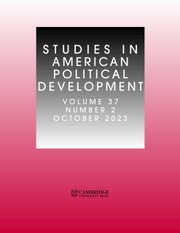- ISSN: 0898-588X (Print), 1469-8692 (Online)
- Frequency: 2 issues per year
Digital archives
Digital archives are available for this journal, providing instant online access to a repository of high-quality digitised historical content. For more information, please see the Cambridge journals digital archive.
Content preservation
Cambridge University Press publications are deposited in the following digital archives to guarantee long-term digital preservation:
- CLOCKSS (journals)
- Portico (journals and books)
Please note that from 2022 (Volume 36) onwards SAPD is an online-only journal with no print version.
Mission Statement
As an intellectual, theoretical, and methodological marker, APD has always comprised many different pieces, not all of them in sync with one another. Some APD scholars see themselves as theorists, emphasizing either the importance of multiple ideological traditions within the nation's historical trajectory following the likes of Tocqueville, Du Bois, and Hartz, or a more general neo-Marxist understanding of power and institutional representation following in the footsteps of Hegel, Weber, and Foucault. Others see themselves more directly as historical and institutional methodologists in search of innovative techniques to make sense of historical data, whether with quantitative or archival materials, and to understand the ways in which institutions and policies maneuver and unfold at varied paces in response to multiple processes.
Understanding the development of key public policies has been a longstanding concern of the subfield, from initial questions about the early development of the regulatory and welfare state to later analyses of movements around labor rights, civil rights, and, most recently, the carceral state. Many scholars have been drawn to the big tent of American political development because they find the APD community more receptive to studying topics, substantive and theoretical, that do not readily fit in the existing mainstream of political science and related disciplines.
Much of the dynamism of APD comes from its eclecticism. We are proud to continue this vibrant tradition, and particularly the ways that the subfield offers a counter to the dominance of specific methods and positivism within mainstream American political science. APD has innovated greatly over the years, making methodological rigor and innovation much more central to its core; but the mission remains distinctive from subfields that are either more formal or that demand causal inference at every turn. In particular, we wish to continue to highlight APD's skepticism towards reductionist models, as well as its distinctive emphasis on mechanisms and theories of power and political formation and construction.
As the new editors, we wish to push the field to go even further in interrogating its theoretical assumptions and methodological priorities, and to expand its substantive understandings of American politics. APD has always been a subfield that has sought to address the biggest questions in politics, whether related to class and capital; race, gender, and sexuality; the formation and development of national ideologies and welfare policy; or the varied sources of political activism. Our strengths are historical and contextual, but the subfield has always had an eye for the present and future.
Today's leading policy concerns and disputes—including global warming, immigration policy, record levels of income inequality, the “deep state,” and the extent and limits of democracy in America, to name just a few—can be better understood by placing them in the context of political and institutional developments from the past.
In today's polarized and fraught political environment, Americans are reexamining their origins and their “story” to establish and legitimate the priorities of the modern era. They are debating fundamental questions, including the meaning of the Constitution, the role of political parties, the legacy of the Civil War and Reconstruction, the expansion of industrial capitalism, and whether the country is an exceptional democracy, a nation of immigrants, or a settler imperial state. In light of federal and state government struggles to respond adequately to COVID-19, policy officials and scholars are also raising questions about institutional capacity and government responsiveness and representativeness to central concerns of employment, health, and the home. The nuanced historical analyses of the kind pioneered by APD scholars can play a pivotal role in illuminating these debates.



